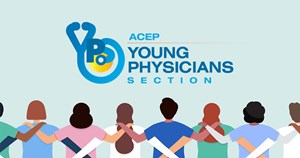Fellowship Spotlight: Informatics Fellowship with Dr. Kwan
In this new video series, ACEP's Young Physicians Section explores the diverse world of emergency medicine fellowships. This episode features Brian Kwan, MD, MS a Clinical Informatics Fellow at University of California – San Diego. Watch the video for a quick overview of his role and keep reading for more details about his fellowship experience.
YPS: Tell us a little bit about the fellowship and walk us through your day-to-day. What does that look like for you?
Dr Kwan: I feel that one thing that’s helpful to understand about informatics is that a lot of people don’t understand what we do. And I didn’t understand what informaticists did before I got involved. There’s an old coders joke “how can you tell when a programmer is an extrovert? They look at your shoes instead of their own shoes.” And that’s what people think. They think I’m a coder and that you have to be a hard-core coder to be involved in informatics. But that’s absolutely not the case. The last course I took in coding was I high school, and it was a pretty basic course. A lot of today’s informatics revolve around electronic health records.
If I was going to summarize this fellowship, I would say [in general terms] it’s the development and optimization of the people, processes and platforms that allow physicians to use technology to take care of patients. Of those three things—people, process, and platforms—the number one important thing is people, people, people. Almost everything we do involves people. It’s more like a socio-technical endeavor rather than just a technical endeavor. And the point of the fellowship is to introduce people to a broad range of fields that informaticists work in which does include a lot of things such as electronic health records.
So operationally, based on things like order set development and user interface, we ask, “How do people design the interface that people use to interact with the health record?” That’s a big part. But another part involves other things like big data—which I know is a buzzword these days—but big data/data analytics, data visualization. How do you take this mountain of data, make sense of it, and provide it to people to make better decisions—the best possible decision—about health care?
Another part of what we do involves cybersecurity. Over the last 10-15 years, there have been some really big cybersecurity incidents where giant health care systems have been hacked, and peoples’ health records have been compromised. There’s also artificial intelligence (AI) and machine learning, which is a huge part, as well as population health. So this fellowship provides a broad-based introduction to all those different areas of informatics.
A typical day is hard to describe because like emergency physicians, my schedule is all over the place. But generally fellowship programs will have their trainees work 20% clinical. My clinical time is split between four physical sites and a virtual clinical site for telehealth. The fellowship does give me time to meet other people in the health system where I work and seek out training courses in areas that are interesting to me.
YPS: What's unique about your fellowship?
Dr. Kwan: At UC-San Diego now there are several large healthcare organizations and a lot of tech– particularly biotech—and that’s an interesting nexus between those three things and makes it an interesting place to be a fellow. Folks in the organization recognize not only the value of what we do, but also that there are physicians in a role who directly impact how technology is designed and deployed. People see the value of having clinicians doing that, and not having a stark divide between people who work in technology and people who see patients. It’s definitely a benefit.
YPS: Why were you interested in this particular fellowship?
Dr Kwan: As I mentioned previously, I feel like informatics happens to people. As a resident I trained in a county program, and we had a disaster situation whereby we had three different health records within a single hospital, and they wanted to get to a single electronic health record. Fortunately, the process had started by the time I got there but as they were switching, they wanted house staff to be involved. I had interest in technology but not a hard-core engineering coding background, but I felt this was an area that was interesting to me as I saw how much healthcare was integrated into technology on a daily basis. I think I was the only house staff involved because no one else wanted anything to do with it out of frustration with the system. Being able to acquire some of that training was an eye-opener for me.
The moment I feel like informatics happened to me [and I had done a bunch of training on electronic health records] was on a very busy night during my trauma rotation as a third-year resident. It was 4:30 AM and we were getting ready to hand everything off to the day team. One of my team members who was fatigued from being up all night was sitting in front of the computer and upset at having to make modifications to every order individually. Because of my training I was able to tell her how to make many of these modifications all at once. It was like a weight lifted from her, and at that moment I realized the effect I can have on people in terms of their ability to take care of patients. To help one overworked resident take just 20 clicks away from her list of things to do. Because that’s the bottom line – the value that we as clinicians bring to this whole enterprise because none of us would have jobs if there weren’t patients to be cared for.
YPS: What has surprised you about it?
Dr Kwan: I’ve always been surprised over and over again at the notion that everything happens for a reason. It might not be a good reason, or rather it might not be a reason I agree with. But there’s always a reason. In addition, one thing I’ve discovered as an interest is the overlap between informatics and quality improvement. I’ve been very surprised that within the process of quality improvement, there are systematic ways to address an issue, come up with solutions and then implement those solutions. I didn’t realize that until I became a fellow. I’ve also had the opportunity to obtain quality improvement training. You may have heard of the lean sort of methodology which was developed by the Toyota company for car manufacturing. But there’s a whole element of that which applies to healthcare. The organization here has been extremely supportive of me and essentially any clinician who wants to take training. And there are multiple courses available to them.
YPS: What's your favorite part about it, and what's your least favorite part?
Dr. Kwan: My favorite part is continually learning about the reach of informatics and how far it goes in delivering health care, and seeing the range of jobs people do and how the technology affects how they do their jobs on a daily basis, and how the technology affects the range of jobs people do and how they do it on a daily basis. It’s nice to be able to see what people are doing in other parts of the organization. I like when people approach me with a problem, and they’ve been trying to solve it one way, but I’ve been able to offer up a better and more systemic way.
And this isn’t my least favorite part, but it’s my most difficult part. While I enjoy seeing other people’s roles outside of emergency medicine, I feel it’s difficult to come from a small county program to a very large academic institution. Learning everyone’s roles is challenging. There have been a number of times where I’ve come to a hard stop, and it’s just a matter of figuring out the right person to talk to. And often times they give me direction that would have been very helpful a couple months ago!
YPS: How do you hope to incorporate the lessons that you've learned in this fellowship into your career plan? And then is this something that you would consider a long term?
Dr Kwan: I would love to find a position where I’m able to use the training I’ve acquired while practicing clinically as an emergency physician. 100%. Electronic health records have been around for a long time, but Informatics Fellowships didn’t start until around 2016, so it hasn’t even been 10 years since the first ACGME-approved fellowship came into existence. So all those people who currently do informatics work, do so having gotten on-the-job training during the last 10-20 years. And they don’t know what to do with us as they’re not familiar with the formal fellowship training. So one challenge is demonstrating the value of what we’re bringing.
In a previous lifetime [medicine is actually my fourth career], I was a high school teacher for nine years, so I’ve always had an interest in education. I think all emergency physicians are educators in one or many different ways. So another area of interest I’ve developed during the course of my fellowship and perhaps a bit before – and it may be presumptuous to call this a field – is what I’ll refer to as medical education informatics. We’re sitting on this mountain of data that is collected by electronic health records and I wonder if there’s a way to take that data and turn it into something that’s educationally viable for medical students, residents or even practicing attendings?
One thing that used to drive me nuts as a resident was logging the number of procedures as part of the ACGME graduation requirements. We’re well trained in how to do the documentation in the electronic health record. But because it’s a siloed system apart from what residency programs use to track procedures to the ACGME, you have to try to remember all the procedures you’ve done and when you have time, go to a separate website and again log everything you’ve done in the electronic health record. It’s incredibly wasteful and duplicative, and it’s been going on for 20-plus years. So I’ve been building a system to extract the data from the electronic health record and upload it to this other website. Initially we thought it was just a nice thing to do for trainees to make their lives a bit easier, but one thing we learned from the data [we ran the system silently at the same time as we were watching what the residents were logging into the other website] is that a lot of procedural data gets lost when they have to go home and log into the other website to enter the data again. People were much more reliably documenting procedures when they’re in the hospital doing other work. It’s a demonstration of the multifaceted areas in which informatics has an influence on clinical practice. We had a problem, and we designed a system to get around that problem. It took a lot of classes and learning a new [computer] language but I find it very interesting and it’s something I want to continue working on.
YPS: Do you have any advice for others who may be interested in a research fellowship?
Dr Kwan: I’ve never had the experience where I’ve approached people who informatics, expressed my interest as a clinician in contributing and have been told no. If anything, a lot of non-clinicians are very appreciative when clinicians approach them because we bring that side of the coin of actually seeing patients which they don’t have. And that’s a very valuable component. I would suggest finding committees at organizations that deal with things like set development or clinical documentation/note template development. It’s a good introduction to the whole process of quality improvement – taking things and making them better.
And then I would reach out to the chief medical information officer(s) and express your interest to them as a resident or a fellow with an interest in informatics and ask how you can get involved. Often, they’re the main contact and help you find the person who can point you in the right direction.
Another thing I would advise is reaching out to electronic health record vendors because most also have some vehicle for end-user clinicians to obtain additional training about the particular system they’re using. Even if you approach a non-clinical analyst who does a lot of technical work and show that you have some degree of familiarity with the language they speak, it sends a message that it’s something you’re interested in. Again, you don’t have to have a ton of background knowledge in this area – you just have to want to make things better in whatever form that takes. The rest will fall into place.



